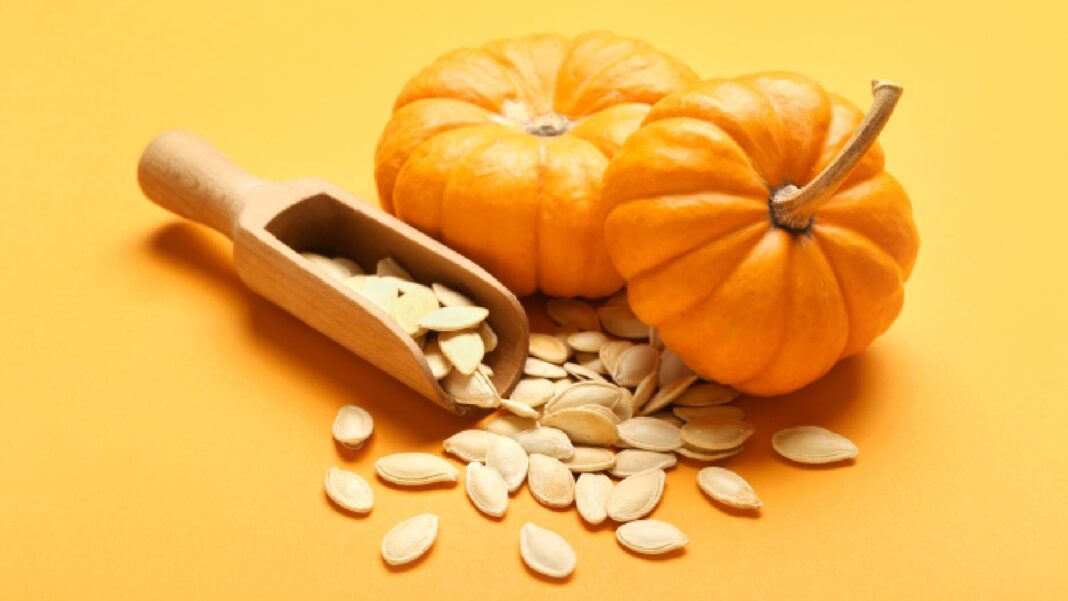There are many pumpkin seeds benefits that can help you get radiant skin. Check out some of the ways to incorporate it in your skincare regime.
Looking for ways to make your skin glow naturally? Start by including pumpkin seeds in your beauty routine. There are many pumpkin seeds benefits when it comes to your skin health. These small seeds are packed with essential nutrients such as zinc, magnesium, and vitamins A and C, making them a treasure trove of health for your skin. Zinc is essential for collagen formation, which keeps the skin tight and youthful. Magnesium soothes inflammation and reduces redness, while vitamins A and C are effective antioxidants that protect your skin from environmental damage and promote cell regeneration. If you are wondering how to include the superfood into your daily skincare regimen, check out some of the ideas below!
5 pumpkin seeds benefits for skin
Here are some pumpkin seeds benefits for skin that will give it a natural glow.
1. Boosts collagen production
Among the many pumpkin seeds benefits for skin, their ability to boost collagen production stands out, as found in a study published in Food Chemistry Advances. Zinc, a mineral abundant in these seeds, plays a crucial role in collagen synthesis. Collagen is a vital protein that provides structure and support to your skin, keeping it firm, elastic, and youthful. By incorporating pumpkin seeds into your diet, you can naturally enhance your body’s collagen production, leading to healthier, more radiant skin.

2. Reduces inflammation
One of the many benefits of pumpkin seeds for the skin is their ability to reduce inflammation. Magnesium, a mineral found in these seeds, has strong anti-inflammatory benefits, as found in a study published in the journal Biocatalysis and Agricultural Biotechnology. This can aid in relieving redness and irritation, making it especially useful for people who have sensitive or acne-prone skin. Adding pumpkin seeds into your diet can naturally reduce inflammation and produce more even skin.
3. Provides hydration
When it comes to skin care, there are many pumpkin seeds benefits that you can take advantage of. One such use is the ability of these seeds to keep the skin hydrated. These seeds nourish your skin from within, thanks to their high concentration of important fatty acids, particularly omega-3s, as found in a study published in the journal Plants. This enhances skin suppleness, prevents dryness, and reduces the appearance of fine lines and wrinkles. Pumpkin seeds can naturally increase your skin’s moisture levels, resulting in a softer, smoother, and more youthful look.
4. Rich in antioxidants
Pumpkin seeds have significant antioxidant qualities, which is one of their many skin perks, as found in a study published in the journal Antioxidants. Vitamins A and C, along with other antioxidants found in these seeds, act as a shield against environmental damage caused by free radicals. Free radicals can accelerate aging and contribute to skin problems. Pumpkin seeds can enhance your skin’s natural defenses, preventing premature ageing and maintaining a healthy, youthful appearance.
5. Regulate oil production
There are many pumpkin seeds benefits for the skin, including the capacity to regulate oil production. “Zinc, a mineral abundant in these seeds, is essential for regulating sebum production, your skin’s natural oil,” says dermatologist Dr DM Mahajan. Excess sebum can result in oily skin and breakouts, while insufficient sebum can cause dryness. By including pumpkin seeds in your daily routine, you may help regulate sebum production and promote healthy, balanced skin for both oily and dry skin types.
Pumpkin seeds benefits for skin: How to use it?
There are many pumpkin seeds benefits when it comes to skincare. Here are some ways to include them in your skincare routine:
1. Pumpkin seed and honey face mask
Mix 2 tablespoons of ground pumpkin seeds with 1 tablespoon of honey to form a smooth paste. Apply evenly to your face and leave for 15-20 minutes. Rinse with lukewarm water. This mask provides gentle exfoliation, hydrates, and helps soothe irritated skin.

2. Pumpkin seed and yoghurt scrub
Combine 1 tablespoon of ground pumpkin seeds with 2 tablespoons of yoghurt. Gently massage the mixture onto your face in circular motions for 2-3 minutes. Rinse thoroughly with lukewarm water. This scrub exfoliates dead skin cells, leaving your skin feeling refreshed and rejuvenated.
3. Pumpkin seed and turmeric face pack
Combine 1 tablespoon of ground pumpkin seeds, 1/2 teaspoon of turmeric powder, and 1 tablespoon of yoghurt all together to form a smooth paste. Apply evenly to your face and leave for 15-20 minutes. Rinse with lukewarm water. This pack helps brighten the skin, reduce inflammation, and fight acne.
4. Pumpkin seed oil face massage
Warm 1 tablespoon of pumpkin seed oil by rubbing it gently between your fingers. Massage this oil lightly into your face and neck in upward circular motions. Leave on overnight or rinse after 20 minutes. Pumpkin seed oil deeply moisturises the skin, improves elasticity, and reduces the appearance of fine lines.
5. Pumpkin seed and oatmeal face mask
Combine 1 tablespoon of ground pumpkin seeds, 1 tablespoon of ground oatmeal, and 1 tablespoon of yoghurt to form a smooth paste. Apply evenly to your face and leave for 15-20 minutes. Rinse with lukewarm water. This mask gently exfoliates, hydrates, and soothes the skin.
Note: Always do a patch test on a small area of skin before applying any DIY face mask to your entire face. If you experience any irritation, discontinue use immediately.
Related FAQs
How many times one should apply pumpkin seed face mask?
The frequency of applying a pumpkin seed face mask depends on your skin type and the specific recipe. Generally, 1-2 times per week is recommended for most skin types.
Is it safe to apply pumpkin seed masks everyday?
No, it is generally not recommended to apply a pumpkin seed face mask every day. Daily use can potentially over-exfoliate the skin, leading to dryness, irritation, and even damage. It is best to follow the recommended frequency for your specific skin type.









